Diana Baumrind Spot-on: Biography, 3 Parenting Styles & Criticism (Spanking)
For years, experts had been giving parents a list of dos and don'ts, but developmental psychologist Diana Baumrind approached parenting from a whole new perspective.
Instead of focusing on specific actions that could harm or help children, Baumrind introduced the idea of parenting styles. And her definition of 3 parenting styles was no less than groundbreaking when she coined them back in the 1960s.
Read all about it here and more too.
In this article on Baumrind, you'll get:
- A biography on
Baumrind
- Insights into her definition of the famous 3 parenting
styles
- Criticism of Baumrind's parenting styles and her
acceptance of spanking
- A list of books and articles by Baumrind
A Quick Intro into Demandingness and Responsiveness
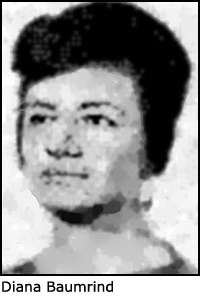 After
much research and observation, Baumrind recognized that it is not
just what you do, but how you do it, that impacts
your children.
After
much research and observation, Baumrind recognized that it is not
just what you do, but how you do it, that impacts
your children.
For example, a child who has a "highly
responsive" parent will react differently to discipline or
correction than a child who is raised in a "highly demanding" home.
In this case, it is not the discipline itself that is the issue, but
the approach, manner - or style - with which it is delivered.
Previously, many parenting experts had been suggesting that
children should be given very rigid rules with high levels of
expectation for compliance. In other words, children should obey
without argument and do whatever they are told.
Those who
disagreed with this theory, proposed the opposite - respond
immediately to children's needs and give love and approval
unconditionally. However, this approach was often misunderstood and
criticized for being too permissive or indulgent.
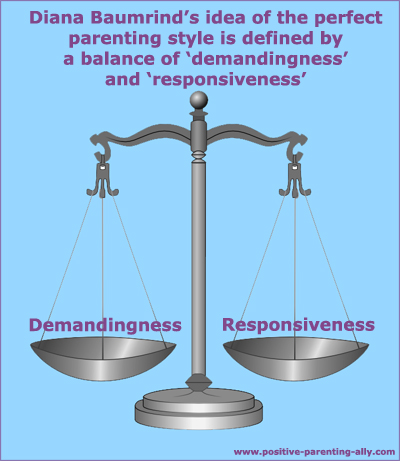 In This
Pendulum of Theories,
In This
Pendulum of Theories,
Diana Baumrind Proposed a Balance of Ideas
Baumrind suggested that "good" parenting should not be one or
the other, but rather the ideal balance of both "responsiveness" and
"demandingness". It was a compromise of sorts, a "meet in the
middle" concept that attempted to take the best of both worlds and
create the perfect parenting style.
Baumrind's 3 parenting
styles inspired a lot of future research that eventually
resulted in a fourth style (the uninvolved parent) being
added in 1983.
Now, nearly five decades later, she is still
considered to be one of the most influential contributors in the
field of parenting.
The Diana Baumrind Biography
Diana Baumrind was born on August 23, 1927, the oldest of two daughters in a
middle class family living in one of New York's small Jewish
neighborhoods.
She earned a B.A. of psychology and
philosophy from Hunter College in 1948, and went on to complete both
a Masters Degree and PhD in clinical and developmental psychology at
the University of California, Berkeley.
After a postdoctoral
residency at Cowell Hospital in Berkeley, Diana took a position as a
research psychologist at the Institute of Human Development at the
University of California, Berkeley.
Her Parenting Styles Theory Sees the Light of Day
In 1966, she published her now
famous article on parenting styles. This was followed by another
article in 1967 that examined the effects of these styles on child
development.
Spokesman for Higher Research Ethics
Baumrind
is also well-known for her work in the area of research ethics. She
argues that misrepresentation and deception should be minimized in
research studies and that subjects should be informed about what to
expect.
She believes that, for the sake of results, honesty
is too often compromised and many people do not really know why they
are being observed or what risks may be involved when they agree to
be part of a research group.
Still Going Strong
Although she is in her 80s,
Diana still remains very active in the field of parenting, heading
the Family Socialization Project at IHD, sitting on the editorial
board for the international journal Parenting: Science and Practice, and acting as a consultant for the Task Force on
Corporal Punishment for the American Psychological Association.
Baumrind's Theories and Contributions
Since the 1960s,
Diana Baumrind has been very influential in the field of parenting.
Her theories resulted in many research studies and articles that
have changed the way parents view the role they play in their
children's lives.
She has consulted on many projects
throughout her career, but she is most famous for the following
contributions:
- Introduction of the 3 Parenting Styles
- Views on physical/corporal punishment
- Criticizing and
encouraging the changing of research practices
Baumrind's 3 Parenting Styles
Even if you have never heard the name
Diana Baumrind, you might know about the "three parenting styles".
Every parent, at some point, questions whether they are
being "too demanding" or "too permissive". They wonder if they are
showing enough love and affection while still setting reasonable
boundaries and teaching self-regulation.
Well, the idea of
being "too strict" or "too lenient" is actually a concept that comes
from Baumrind's theories. She proposed that there are three
parenting styles, and that each style leads to specific outcomes.
Basically, Diana States that Parenting Is a Combination of Two Factors:
- Responsiveness - how well parents respond to their
children's needs
- Demandingness - the level of maturity or responsibility parents expect from their children at different points of development
The parenting styles are really based
on various combinations of these factors.
In other words,
how responsive or how demanding you are will determine which
category applies to your parenting approach - you can take my test
here.
-
Authoritarian - high level of demandingness with a low
level of responsiveness. This type of parenting is very rigid,
behavior-based, and controlling. Children raised in strict
authoritarian homes tend to be anxious, withdrawn, and feel like
they have to earn love or approval.
-
Permissive - low
level of demandingness with a high level of responsiveness. Baumrind
states that this style of parenting is very indulgent and lacks
rules or boundaries. According to Baumrind, children raised in a
permissive environment risk becoming rebellious, defiant, selfish,
and have poor emotional regulation.
- Authoritative - a balance of demandingness and responsiveness. According to Baumrind, this is the ideal form of parenting. Parents are responsive to their children, but still provide some guidelines for expected behavior. The authoritative parents will not only set standards for their children, but will also model this behavior themselves.
Basically, Diana Baumrind is saying that the authoritarian style is "too hard", the permissive style is "too soft", and the authoritative is "just right".
Here is a video that in a few words explains Diana Baumrind's parenting styles:
Criticism of Baumrind's Parenting Styles
Is
Showing Unconditional Love Really Permissiveness?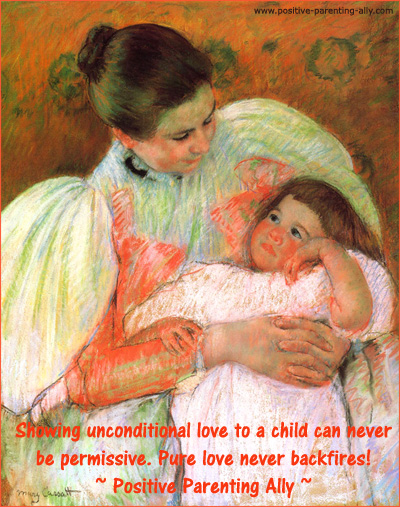
While there is
a lot of research to support Baumrind's ideas, many parenting experts have questioned her emphasis on the need for firm (not
rigid) rules and controls.
Baumrind argues that the proper use of
disapproval, balanced with love and affection, is what is best for
children.
However, there are those within the field of
parenting (e.g.
Alfie Kohn), that believe "disapproval" is a
form of "love withdrawal" and can actually have a negative impact on
development.
Also, when considering popular theories such as
those promoted by
Benjamin Spock or Alfie Kohn, one has to
ask if "high responsiveness" without "high demandingness" really is
synonymous with "permissiveness"?
That is what Baumrind
implies.
But, a lot of research has shown that focusing primarily on
meeting children's needs produces well-adjusted, self-confident
children who don't need external controls.
The Addition of a Fourth Parenting Style to Complete the Model
In 1983, researchers Eleanor Maccoby
and John Martin felt that Diana Baumrind's theory was incomplete and
introduced a fourth parenting style - the uninvolved parent.
These parents are neither demanding nor responsive. Basically,
they don't care. And, children of uninvolved parents often "act out"
or become involved in deviant behaviors in an effort to get their
parents' attention.
Baumrind on Physical Punishment
Baumrind has been the cause of a lot of controversy because of her stance on physical or corporal punishment.
Baumrind's Conviction: Authoritative Spanking Doesn't Harm the Child
Diana Baumrind supports the occasional use of
spanking as a form of discipline and states that her research has
shown no negative long-term impact on children if the punishment is
delivered within an authoritative style where the child does not
perceive the action as harsh or cruel.
She also states that
abusive parents are typically authoritarian, although not all
authoritarian style parents are abusive.
But, this stance
continues to be a controversy within the parenting field.
Experts Disagree: Treating 'Bad' with 'Bad' Doesn't Work
Many researchers disagree vehemently
with Baumrind (and many countries have also banned physical
punishment both in school and at home).
They claim that the more a parent uses physical punishment the
greater the likelihood of this punishment escalating to abuse.
Some experts also believe that punishing a child using physical
aggression will encourage them to become more physically aggressive
themselves.
And the bottom line is - does it make sense?
Isn't spanking a child for something such as throwing a toy at a
friend, biting, or hitting another child an oxymoron? ... I'm going to
hit you to teach you that hitting is wrong? Even as an adult, that
makes no sense, so how can we expect our children to understand?
Baumrind's View on Research Ethics - More of Honesty Towards the Subjects
Baumrind has had great influence in the area of
research ethics, which began with her strong response to
Stanley Milgrim's 1963 Study of Obedience.
Milgrim
told his study subjects that he was conducting research on the
relationship between punishment and learning when, in fact, he was
actually testing people's compliance to authority to determine how
far someone would be willing to go for the sake of obedience.
Baumrind disagreed with the deception, claiming that Milgrim
created high levels of stress in the subjects, and failed to show
respect or concern for participant's welfare.
She believed
that once the truth was revealed, many subjects would feel used,
embarrassed, and distrustful of authority in the future.
Basically, she felt that the relationship between the researcher and
the subjects had been violated.
In response to her criticism, many
researchers claimed that a certain amount of deception is necessary
to get accurate results.
For example, parents are going to be on
their "best behavior" if they know that they are being observed. Or,
an adolescent is not likely to engage in deviant behavior if a
police officer is within sight.
Despite a continuing
argument, Baumrind has been influential in changing the way much
research is done and in making sure that subjects are treated less
like lab rats and more like human beings.
Books and Articles by Baumrind
As a researcher, Baumrind has written many
journal articles and book chapters on parenting styles, family
socialization, moral development, adolescence, and research ethics.
Much of her work is very "clinical", meaning that it is
written for other experts and researchers within the field of
psychology.
However, some of her writings have become quite
famous and can be very informative, even for parents who don't
necessarily agree with her viewpoints.
Articles
Effect of
Authoritative Parental Control on Child Behavior (1966)
&
Child Care
Practices Anteceding Three Patterns of Preschool Behavior (1967)
These two articles earned Baumrind recognition within the field
of parenting.
They introduced the three parenting styles and
examined the effects that these child-rearing practices have on
behavior.
These articles outline a very detailed study
contrasting self-reliant, mature, trusting, and content children
with those who were distrustful, unhappy, immature, and dependent.
By observing the various parenting styles, Baumrind looked
at the relationship between development and parental control.
Factors discussed included punishment, authority, freedom and
autonomy, self-regulation, and fear.
The article concludes
with the observation that the authoritative parenting style is the perfect balance and the best approach for both the parents
and children.
Article
Child Maltreatment and Optimal Caregiving in Social Contexts
This article summarizes a study that looked
at the relationship between income level and child abuse or
maltreatment.
Baumrind observed several families, taking
into account finances, maternal youth, marital status, foster care,
and personality.
The article also covers the psychological
characteristics of abusive parents, although much of her research
concludes that poverty is the strongest determining factor for
maltreatment.
Book
Parenting for Character: Five Experts, Five Practices
This is a book about raising "good kids", with the
definition of "good" being empathetic, altruistic, moral, competent,
and having strong consciences.
Five parenting experts have
taken all their years of research and knowledge and put it together
to make a manual that parents can use to help "maximize their
children's potential" for becoming self-confident, fair, and giving
individuals.
Diana Baumrind has contributed a chapter on
authoritative parenting and how this method can lead to character
and competence in children.
Article
The Influence of Parenting Style on Adolescent Competence and Substance Use
This article is
the summary of a study involving 139 children who were observed at
ages 4, 10, and 15 to determine the effects of parenting styles on
their development, particularly the likelihood of substance use.
Various family types were included - authoritative, democratic,
directive, non-directive, unengaged - and it was found that children
from authoritative and democratic homes were more mature,
optimistic, and had more positive attitudes about their parents.
These children were also less likely to become involved in deviant
behavior such as alcohol or drug use.
Article
The Discipline Controversy Revisited
In this article, Baumrind readdresses
her earlier views on physical discipline. Again, she states that one
extreme or the other is not beneficial.
A parenting approach
that uses strict corporal punishment can lead to as many problems as
one that includes indulgent permissiveness.
Her solution?
Balance is the best!:
- "It is argued here that within a responsive and supportive parent-child relationship, prudent use of punishment is a necessary tool in the disciplinary encounter." (Quote by Diana Baumrind)
Baumrind takes into account historical and cultural factors, as well as family situations and stages of development.
Your Positive Parenting Ally,
Birgitte

Want to stay in touch and get the latest news?
Sign up
for my free newsletter
Parent Coaching
- For Inner Peace, Clarity and a Deeper Connection to Your Child
 Being a parent can feel like a double-edged sword. Life with kids may feel like the greatest gift you have ever received, while at the same being hugely challenging, often leaving you confused, stressed and overwhelmed.
Being a parent can feel like a double-edged sword. Life with kids may feel like the greatest gift you have ever received, while at the same being hugely challenging, often leaving you confused, stressed and overwhelmed.
When we feel like this, we've lost touch with ourselves. We can't hear our own inner voice, and it's difficult to know what is 'right' for us and how to act.
I offer in-depth parent coaching to help you regain your balance and get back in touch with yourself. From a place of inner peace and clarity, your will find your own answers which will help you reconnect with your child from a place of unconditional love and acceptance.
Read more about my parent coaching here.
Where Would You Like to Go Next?
Famous Parenting Experts Overview
 Famous Parenting Experts and Their Parenting Styles Theories: Humanism vs. Behaviorism. |
Parenting Experts Related to HUMANISTIC Parenting Styles (Founders, Refiners, Supporters or 'Coiners')
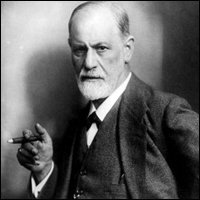 Sigmund Freud the Controversial Pioneer of Psychology: The Famous Psychosexual Stages of Child Development. |
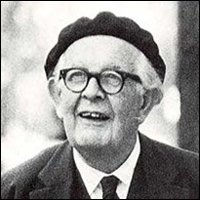 Jean Piaget Biography, Theories and Books: The Earliest Torch Bearer of Humanism. |
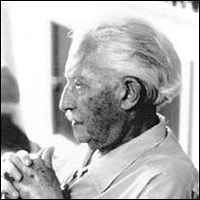 Erik Erikson Biography and Theories: The 8 Developmental Stages, Identity Crisis and Ego Identity. |
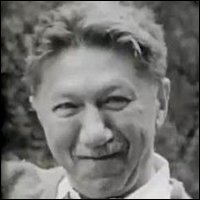 Abraham Maslow Biography: The Father of Humanistic Psychology and Self Actualization Theory. |
 Dr. Benjamin Spock Biography, Theories and Books: The Controversial Forefather of Intuitive Parenting. |
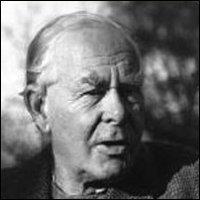 A Biography of John Bowlby: The Father of Attachment Theory. |
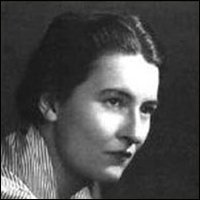 An Intriguing Mary Ainsworth Biography: The Refiner of Attachment Theory. |
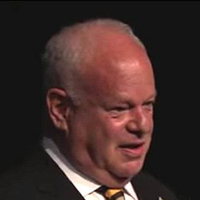 Martin Seligman: The Critic of Traditional Psychology and Father of Positive Psychology. |
 Carl Rogers Biography, Theories and Books: The Founder of Humanistic Psychology. |
 Alfie Kohn Biography, Theories and Books: The Father of Unconditional Parenting. |
 Deep Insights into the Essence of Dr Sears' Attachment Parenting - Along with a Fascinating Historical View on the Slow Rising Consciousness of Attachment Parenting. |
Parenting Experts Related to BEHAVIORIST Parenting Styles (Founders, Refiners, Supporters or 'Coiners')
 John B Watson Biography, Theories and Books: The Father of Behaviorism. |
 B. F. Skinner Biography, Theories and Books: Father of Radical Behavorism. |
 Amy Chua Biography and Theories: Tiger Mother's 9 Parenting Principles. |
Back to the top of this page about Diana Baumrind Spot-on: Biography, 3 Parenting Styles & Criticism (Spanking)
Go to the Positive Parenting Ally Homepage







